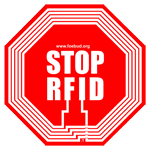RFID – a dangerous fashion trend highlighted on German streets by FoeBuD
On 11 January 2011, German privacy NGO FoeBuD staged an event on a shopping street in Bielefeld, Germany, to raise awareness about RFID tags (“spy chips”) in clothing.
FoeBuD played an important role in putting this issue on the political agenda from 2003, when major German retailer Metro AG conducted RFID field trials in a model supermarket, dubbed “Future Store”. While RFID roll-outs in supermarkets have not occurred as quickly as expected at that time (probably due in part to the concerns raised by privacy advocates), recently the fashion industry seems to have taken a lead in introducing RFID in goods sold to and carried by consumers.
RFID (“Radio Frequency Identification”) tags are tiny chips with an antenna; they respond to a radio signal by transmitting back some previously stored data including their unique serial number. Because every single chip can be recognised by this ID, an RFID tag is not just a contactless product bar code – it allows every individual item to be identified. This makes RFID a very interesting technology for retail logistics. But an RFID tag on a highly personal item (such as a piece of clothing) could identify its owner if the owner’s personal data somehow becomes available – if the owner makes a payment with a card, for example. The owner’s data does not need to be stored on the chip itself, it could be related to the chip’s ID via an external database. Personal tracking becomes a distinct possibility, indeed a patent for this has been granted in the US.
FoeBuD activists find a hidden spy chip in a passing woman’s jacket | Photo: Veit Mette | free for publication | cc-by-sa
At this event, FoeBuD targeted local fashion company Gerry Weber and Italian fashion brand Peuterey (which had received a German Big Brother Award from FoeBuD in 2011 for introducing RFID in a particularly secretive way). Gerry Weber had actually been in contact with FoeBuD about their RFID roll-out, but had ultimately chosen not to implement a fundamental requirement: that the RFID tags be detached from every item at the point of sale, without the customer having to ask for this. The FoeBuD activists had alerted Gerry Weber about their action and were met by the company’s CIO and RFID project leader, and later by the company’s owner Gerhard Weber himself, who regrettably did not show a lot of understanding towards the activists’ concerns. But at least it is possible to tear off Gerry Weber’s RFID tags. In contrast, Peuterey does not give any in-store information to its customers, and their RFID tags are sown in beneath a label imprinted “do not remove this label”.
FoeBuD’s event and their demand that all RFID tags be removed or permanently disabled at the point of sale were covered by regional TV and by newspapers across Germany. The group hopes to keep the momentum going.
Sources (only in German unless stated)
FoeBuD’s coverage about their action, with pictures (01/2012)
http://www.foebud.org/rfid/wdr-sendung-markt-kleidungsstuecke-mit-rfid-schnueffelchips-verwanzt/
Coverage by regional public TV station WDR (16.01.2012)
http://www.wdr.de/tv/markt/sendungsbeitraege/2012/0116/01_rfid-chips.jsp
Press report: Privacy advocates discover RFID chips in clothing (16.01.2012)
http://www.zeit.de/digital/datenschutz/2012-01/foebud-rfid-gerry-weber
Press report: Why RFID tags are a danger to consumers (18.01.2012)
http://www.sueddeutsche.de/digital/2.220/rfid-aufkleber-als-schnueffelchips-warum-funketiketten-eine-gefahr-fuer-verbraucher-sind-1.1260505
BigBrotherAward 2011 to Peuterey (full award speech in German, English summary with full
translation forthcoming)
https://www.bigbrotherawards.de/2011/.tec
BigBrotherAward 2003 to Metro (English and German)
https://www.bigbrotherawards.de/2003/.cop
Report in English on Metro’s “Future Store” and 2003/04 RFID scandal:
http://www.spychips.com/metro/overview.html
US patent 7,076,441 on “Identification and tracking of persons using RFID-tagged items in store environments”
http://patft.uspto.gov/netacgi/nph-Parser?Sect2=PTO1&Sect2=HITOFF&p=1&u=/netahtml/PTO/search-bool.html&r=1&f=G&l=50&d=PALL&RefSrch=yes&Query=PN/7076441
(Also published in issue 10.3 (15 February 2012) of EDRi-gram, the European Digital Rights newsletter)
2012-02-17 18:24



